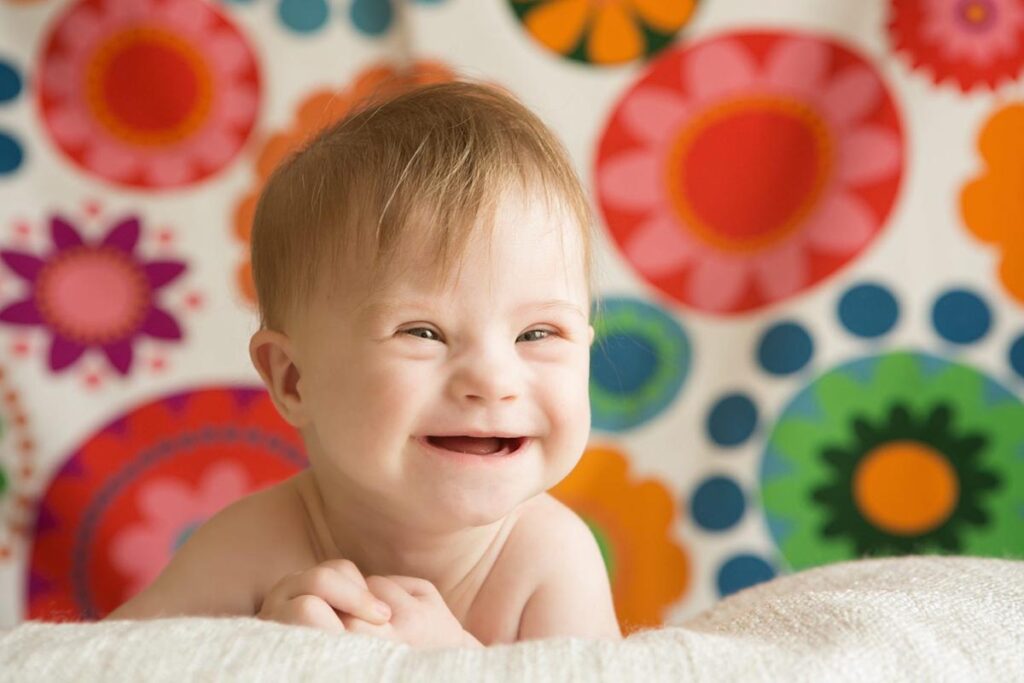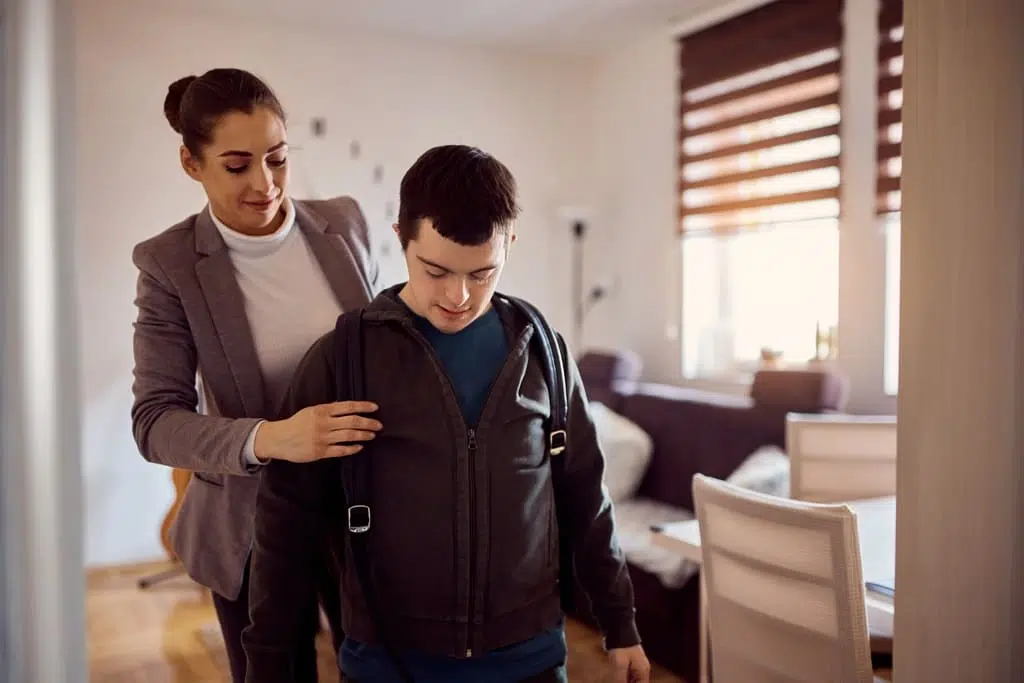What is Down Syndrome?
People with Down Syndrome are born with an extra chromosome. Having that extra chromosome (number 21) can change a person’s physical features, cognitive ability and body development, like physical growth and mild to moderate intellectual disability. People that have Down Syndrome may have a learning disability.
Both adults and children with Down Syndrome can potentially develop a learning disability. They will still have a wide range of skills, can become more independent, and find employment, though some people could require more regular care and support.
Why is it Called Down Syndrome?
John Langdon Down, an English physician, was given the title of “father” of the syndrome after he recognised and published the first description of a person with Down Syndrome. Although other people had previously noticed the characteristics of the syndrome, Down was recognised by identifying the condition as a unique and distinct condition.
Human chromosomes, referred to as small “packages” of genes, determine how a developing baby’s body and mind will form both during pregnancy and after birth. Most babies are born with 46 chromosomes, while babies with Down Syndrome have an extra chromosome.
Signs and Symptoms of Down Syndrome
People with Down Syndrome can have learning disabilities and physical health needs, and until a baby is born it is difficult to predict the impact as every individual is unique. Their intellectual and developmental differences might be mild, moderate or severe. Although babies with Down Syndrome may be born at a regular size, they often grow slowly and stay smaller than children of the same age.
The most common physical differences include:
Almond-shaped eyes (in a way that is not typical for the ethnic group they come from)
Small ears, possibly folded-over
Distinctive facial features
The symptoms of Down Syndrome may differ from person to person since not every person or child with Down Syndrome has them all.
Signs of Down Syndrome During Pregnancy
Mothers don’t tend to experience any signs of carrying a child with Down Syndrome. However, the probability of carrying a baby with Down Syndrome can be assessed by screening tests during pregnancy. The option to take a screening test while a woman is pregnant to determine the chances of having a child with Down Syndrome is available.
Screening tests can be performed around 11 to 14 weeks when a dating scan is provided. The mother can get further screening tests if her chances are higher.

What Causes Down Syndrome
There are typically 23 pairs of chromosomes in human cells. Each pair of chromosomes contains one from your mother and one from your father. A faulty cell division related to Chromosome 21 causes Down Syndrome. This additional genetic material contributes Down Syndrome’s particular characteristics and developmental issues by attaching one chromosome to another.
Having extra copies of chromosomes disrupts the process of what’s known as typical development, causing the characteristic features of Down Syndrome. People with Down Syndrome have an increased risk of health problems that are connected to this condition. Down Syndrome is also associated with an increased risk of developing Alzheimer’s disease.
Is Down Syndrome Hereditary?
In most cases, Down Syndrome is not hereditary, which means it is not inherited and does not run in the family. Down Syndrome is a genetic mutation caused by a mistake between a sperm and an egg. Only a small percentage of children with Down Syndrome—roughly 3–4 per cent—have Translocation down syndrome, which means it was inherited it from one of their parents.
How is Down Syndrome Diagnosed?
Down Syndrome can be diagnosed with the help of two tests during pregnancy:
- Screening tests
- Diagnostic tests
Screening tests can indicate whether pregnant women have a higher or lower chance of carrying a baby with Down Syndrome, although they don’t offer a definitive diagnosis.
Diagnostic tests could put the mother and baby at higher risk, but these tests can tell whether the baby will have Down Syndrome and can identify specific abnormalities.
The various test types, benefits and risks, advantages and disadvantages, and the significance of your results can all be discussed with your doctor. Your medical health provider might suggest you consult a genetics counsellor if appropriate.
Types of Down Syndrome
There are three types of Down syndrome:
Trisomy 21
As the most common type, about 95% of people with Down Syndrome have Trisomy 21. Due to an error in cell division, each cell in the body has three distinct copies of chromosome 21 instead of having two copies.
Mosaic Down Syndrome
Only 2% of people with Down Syndrome are diagnosed with Mosaic Down syndrome. Some cells in children with Mosaic Down Syndrome have three copies of chromosome 21, while others have the typical two copies of chromosome 21.
Translocation Down Syndrome
Translocation Down Syndrome occurs in only 3% of people and children with Down Syndrome. It happens when an extra copy of chromosome 21 is present, but it is not a separate chromosome 21; instead, it is attached to another chromosome.
Characteristics of Down Syndrome
The characteristics of Down Syndrome include:
- Physical Symptoms
Typically, people with the condition share specific physical features of Down Syndrome and certain facial features, including:
- Small in stature with a short neck
- Short fingers and small hands
- Poor muscle tone
- Loose joints
Children with Down Syndrome might take longer to accomplish developmental goals, such as crawling, talking and walking.


Intellectual Symptoms
Down syndrome can also cause cognitive (thinking) and behavioural symptoms that affect a person’s abilities to think, interpret and understand.
It is important to remember that each child with Down Syndrome will gain skills in their own time and not compare them to their typical peers or even kids with the same diagnosis.
How Many Babies are Born With Down Syndrome?
One out of every 1000 babies in the UK will have Down Syndrome. Each person with Down Syndrome has their own personality, family history, and interests that define who they are. One factor that increases the risk of having a baby with Down Syndrome is the mother’s age.
How Down Syndrome Affects Physical Health
Most people with Down Syndrome don’t have any additional genetic abnormalities. They have typical facial characteristics, but some people with Down Syndrome may have one or more significant birth abnormalities or other health problems. Some of the health-related problems affecting children and adults with Down Syndrome more frequently include:
- Heart problems at birth
- Hearing and vision problems
- Obstructive sleep apnoea
- Early Onset Dementia
- Blood related conditions
- Eye and ear infections
Individuals with Down Syndrome are also more likely to experience:
- Intestinal blockages
- Thyroid problems
- Skin problems
- Weight gain
Health care professionals often assess children with Down Syndrome, getting routine medical care that helps to maintain a healthy lifestyle.
Treatments and Help


Down Syndrome is a lifelong condition. The average life expectancy of those with Down Syndrome has significantly increased, and today a person with Down Syndrome can anticipate living for over 60 years, depending on how severe their health concerns are. Treatments typically come under early intervention programmes, including speech, physical and occupational therapy. Children with Down Syndrome may also require additional support or attention in the classroom.
At Leaf Complex Care, we offer support services for complex needs in the comfort of your home. We focus on delivering humanised support services to assist children and adults with Down Syndrome to become more independent and unleash their full potential. It is crucial for us as an inclusive organisation to treat people better, bring more humanised approaches, and accept people for who they are, supporting others to have a better quality of life.
Our highly-qualified support workers bond with the people we support and understand that they have unique personalities, interests and behaviours that make them who they are. That way, we bring reassurance to families who have entrusted us with their loved ones.
Contact us now for further information, and let us guide you throughout the care journey!
Will's Story
Will is a 24-year-old man with Down Syndrome who displayed behaviours that challenge earlier in life due to inconsistent support by care providers. Will received a care package from one care provider that didn’t last long, so his mother decided to ask for help. When Leaf Complex Care came along, they developed a person-centred, Positive Behaviour Support plan, and things started improving.
Today, Will and his mom both gained confidence that Will can be an active member of the community, spend time with friends outside of the home and do all the things he loves and enjoys. With the help of Leaf, this family’s life changed dramatically:
“The social worker queried why they were no longer getting incident reports, but it was because there were none to report. This has enabled Will to become a more active member of his community.”
Quick Summary
- People with Down syndrome are born with an extra copy of chromosome 21. It is related to intellectual disability, a characteristic facial expression, and early-onset hypotonia (poor muscle tone).
- People who inherit an unbalanced translocation involving chromosome 21 may have extra genetic material from chromosome 21, which causes Down Syndrome.
- There are three types of Down Syndrome - Trisomy 21, Mosaic Down Syndrome, and Translocation Down Syndrome.
- Down Syndrome can also be associated with other health problems, including heart differences, endocrine disorders and hearing and vision problems amongst others.
- The hereditary component of Down Syndrome only accounts for 1% of all cases (passed from parent to child through the genes).
- To achieve a higher quality of life, it is essential for Leaf Complex Care as an inclusive organisation that we treat people better, adopt more humanised support solutions, and accept individuals for who they are.
FAQs
What is the Life Expectancy for People with Down Syndrome
– Today, a person with Down Syndrome can expect to live for about 60 years on average.
What causes Down Syndrome in pregnancy?
– That extra chromosome! A baby usually gets an extra chromosome by accident due to a change in the sperm or egg before birth.
What gender is most affected by Down Syndrome?
– Babies with Down Syndrome that have a confirmed diagnosis are predominantly male.







